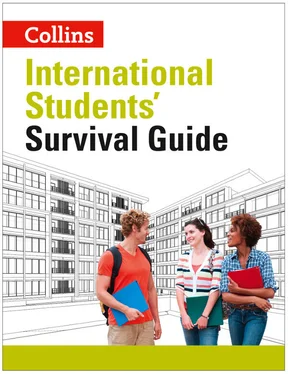WARNING:Sometimes international students are offered illegal jobs. Employers who hire students illegally usually pay in cash. This means the government doesn’t find out how many hours you work or how much you’re being paid. As a result, your boss can ask you to work more hours than you want, pay you too little, and threaten to call Immigration if you complain. Do not accept this kind of job. In the US, you could also be deported if you’re caught working illegally.
For most jobs, your pay will need to go into a local bank account or a credit union account. Decide which bank you want to use and go to a bank branch to open an account. You’ll need to bring along identification. Good forms of identification include your passport, your driver’s license, your student ID card, or a bill with your local address on it. In the UK you’ll need your passport or national ID photo card, and a letter confirming your study details.
You’ll also need to register for tax. Check what you need to do in the country where you’ll be staying. In Australia, this means you’ll need to apply for a tax file number. In the UK you’ll need to pay income tax when you earn over a certain amount. You’ll also pay “national insurance” (NI) and need an NI number for this, but you only have to apply for this after you start work. In the US, you’ll need to apply for a Social Security card, which is used for tax purposes and many other banking-related issues. Never write this number down or give it to anyone over the phone or email. You’ll also have to fill out a tax return by April 15th of each year. If you don’t do this, you can get into trouble with the Internal Revenue Service (IRS). Talk to your college/university job center for advice on this issue.
Words you may see when looking for a job
CV (curriculum vitae) or résumé: “CV” is the word used in the UK and Australia whereas “résumé” is usually used in the US (except in academic and many high-level positions, where you might see “CV”). This is a summary of your education and previous work experience. You can also include any awards you have won, and a description of any other activities or interests which are related to the job you’re applying for. It may also list referees (see below). Look online for examples of how to put together a CV. Prepare this before you leave your home country.
References (Referees): You usually list two or three people who can recommend you when you apply for a job. These people are called “references” or “referees.” A reference could be a previous boss, a professor/lecturer, or someone else who knows you well. If you want to use someone as a reference, contact them, tell them about the job (or that you’re going to use them as a reference on your CV or résumé) and make sure they’re happy for you to give out their contact details.
Cover letter (or Covering letter in the UK): This is a letter that you submit to possible employers with your CV or résumé. The letter says which job you are applying for and why you think you would be suitable for the job.
Selection criteria: Sometimes employers will put up a numbered list of the qualities they want in the person they want to hire. These qualities are called “selection criteria” or “job specifications.” You need to show them that you meet all of their selection criteria to get the job. Sometimes they divide the criteria into “essential” (which you must have) and “desirable” (which if you have, you have a better chance of getting the job).
When you apply for a job in writing, employers may invite you to come to a job interview. This means that they have read your application and CV or résumé, and would like to talk to you to decide whether they will give you the job. This usually means that they think you have the skills to do the job, but want to find out what kind of person you are before they hire you.
Here are some tips if you’re invited to a job interview.
Turn up at least ten minutes early. This shows your employer that you’re reliable and punctual, and gives you time to rest a bit and prepare yourself before the interview.
Dress carefully. What you should wear will depend on what sort of job it is. For a professional position, such as an internship at a big firm, you should dress well (e.g. a suit and tie for men, a nice skirt or pants/trousers and a blouse for women). For a casual job, you may not need to dress up so much, but your clothes should still be clean, tidy, and free of any wrinkles or damage. If you need ideas on what to wear, ask your college careers advisor or friends who’ve had similar jobs. If you can, look at what other employees of a similar level to the job you’ve applied for are wearing. Check photos on the company website, or look at employees at work or walking into the building.
Try to be relaxed, friendly, and confident. Remember that you’re being interviewed because the employer thought you sounded like a good employee! Show them that you’d be a good person to work with. Breathe deeply, sit up straight, look your interviewers in the eye, and speak clearly.
Don’t try to be humble, or downplay your achievements. In English-speaking countries, you’re expected to “sell yourself” at a job interview. Focus on your strengths, and remember that you can always learn new skills and obtain new knowledge if they need it.
Don’t keep referring to information that’s written on your résumé or CV, such as your grades or marks, unless the interviewers ask you about it. Your interviewers will have read your résumé, and probably have it in front of them. Even if your grades are excellent, remember they’re looking for a good worker, not just a good student!
What will you need during your time abroad? Many international students take too much stuff! Remember you’ll have a luggage allowance on your flight. Go online to check what your luggage allowance is. The airline will charge you a lot of money if your luggage is too heavy.
Start thinking about what to pack a few weeks before you leave, especially if you haven’t lived abroad long-term before. This gives you time to buy things before you go. Check the website of the institution where you are going. It often has suggestions for what to pack.
You’ll also need to think about dividing up your luggage into carry-on luggage and what goes into the hold.
Carry-on luggage is the luggage that you take on the plane with you. You have access to this during the flight. This can also be called “hand luggage.”
You’ll need to decide what you’re going to take as carry-on and what items you’ll put in your main luggage that goes into the hold. Remember airlines have restrictions on how much carry-on luggage you can take and what you can take, in particular regarding liquids and gels, so check the website of the airline you are flying with.
These are some of the things you should carry with you in your carry-on luggage:
your passport
your visa if you need one
your credit card or bank cards
details of your travel or health insurance
a list of people to contact in case of emergency
details of any significant health issues
prescriptions for medication, contact lenses, or glasses
documents relating to your study, such as the enrollment details for your classes, results from previous study, transcripts, etc.
Anything of high value, such as jewelry. You don’t want to risk things being stolen while being handled by the airline.
Читать дальше












